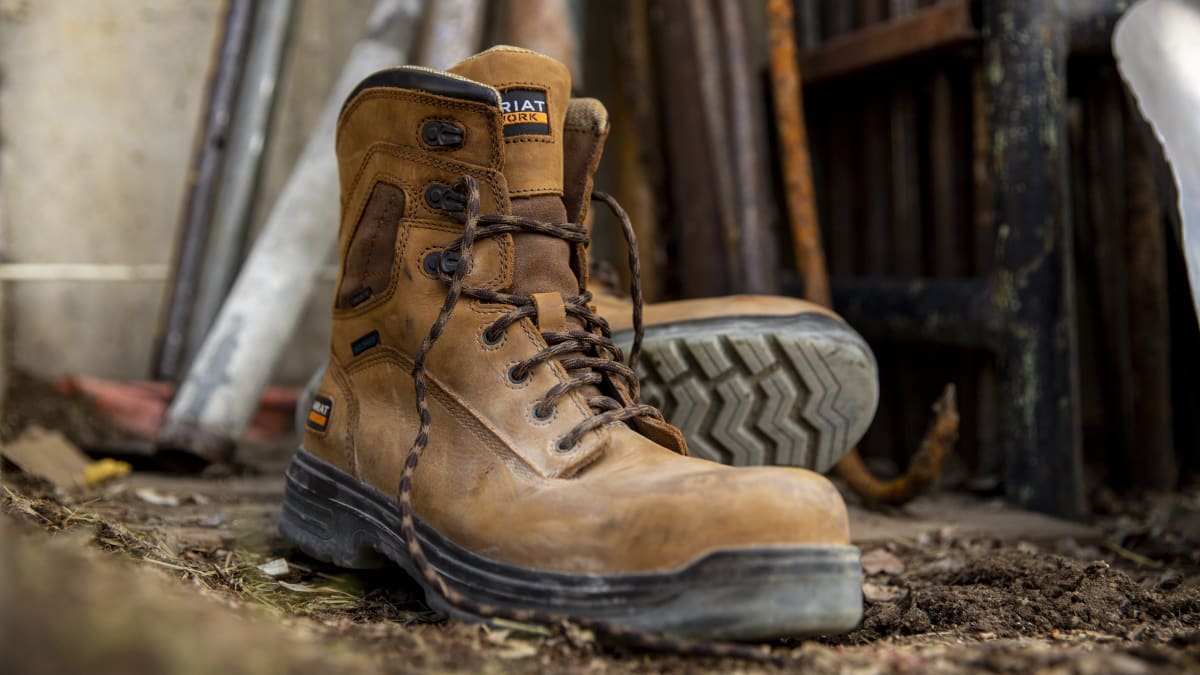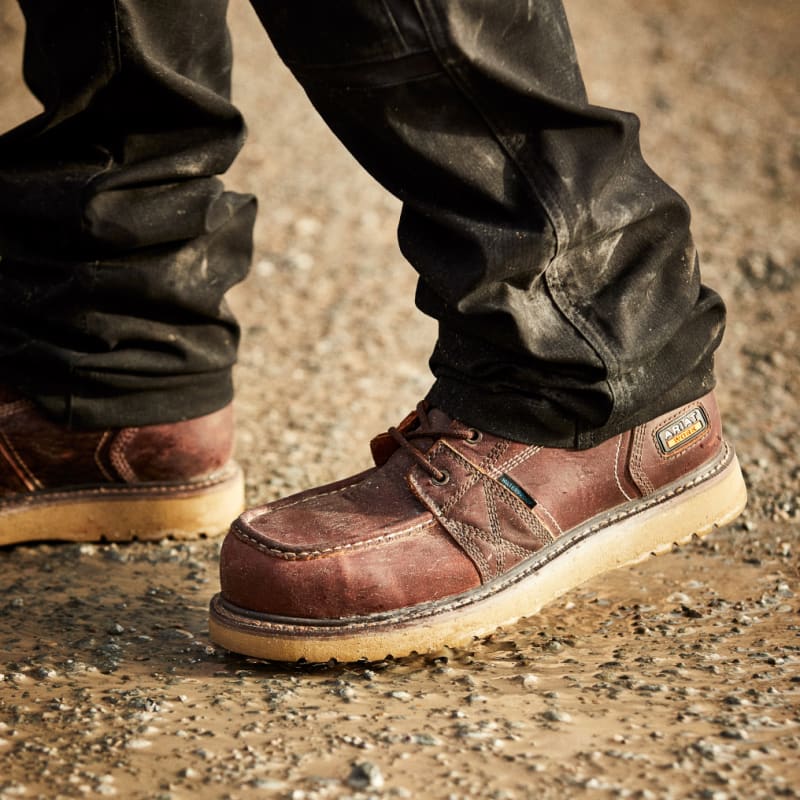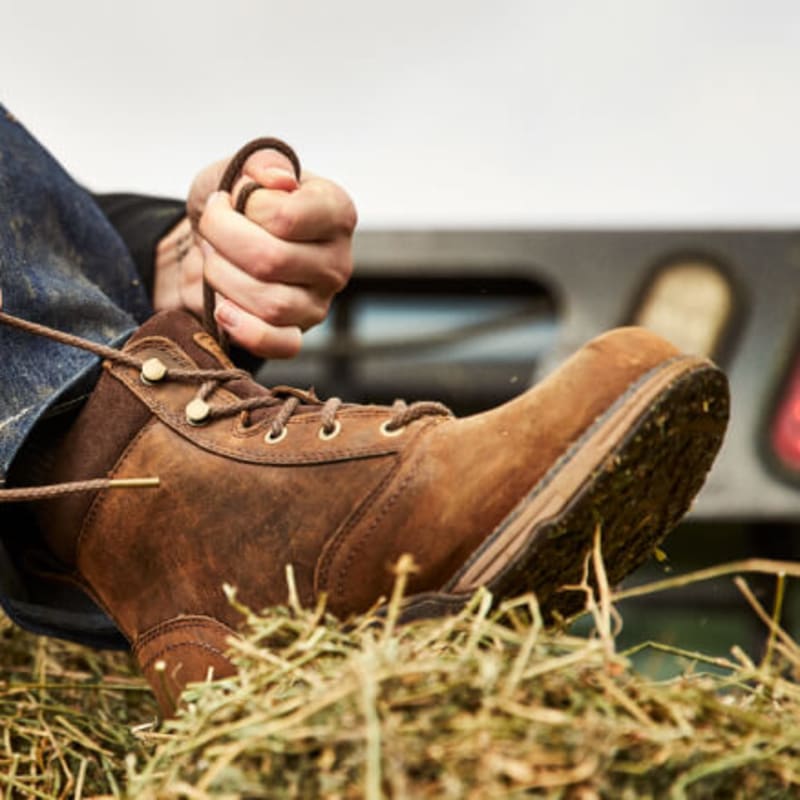
How to Clean and Maintain Work Boots
Extend the lifespan of your boots by learning how to care for leather work boots. Find out about leather work boot care, including how to clean work boots to keep your feet fresh all day.
Looking to get a little more life out of your boots? Make your leather boots like new again with thorough, regular cleanings. When you learn how to care for leather work boots, your feet and your boots reap the benefits. Cleaning work boots extends their lifespan and can contribute to healthier feet. Discover the ins and outs of leather work boot care.
How to Clean Leather Work Boots: The Basics
- Remove laces: If you have lace-up work boots, remove your laces and soak them in water mixed with a couple drops of dish soap. Hang them up to air dry and complete the remaining steps before lacing up your boots again.
- Knock off dirt: Firmly tap your boots together to remove dried mud and dirt. Use a soft nylon brush to gently knock away remaining dirt.
- Wipe them down: Using a damp cloth, wipe off remaining dust. Pay special attention to toes, seams and crevices, like the tongue of the boot.
- Hose off wet mud: Spray off the bottom and exterior of your work boots to remove any wet muck. If the boots have soaked through, remove the insoles and hand scrub with dish soap. Then spray out the inside of the boot. Set boots to dry in the sun or on a boot dryer, but do not put your boots under high heat (like in the dryer) as this can damage the boot.
- For tough stains, use a water-based cleaner: If spots remain, use a cleaner with a sponge to work off any stains or stubborn dirt. Water with a small amount of dish soap can also be safely used but avoid anything harsh, like alcohol, that could damage your work boots.
- Condition or Oil: Cleaning can dry out leather and cause it to crack, so always follow a cleaning with conditioning or oiling. Be sure your boots are dry, then rub a small amount of conditioner or boot oil into the leather. Don’t panic if your boots look darker but be careful not to
After following these steps for how to clean leather work boots, there are a few things you can do to keep your work boots in top shape month after month. These are a few commonly asked questions about cleaning work boots and leather work boot care.

How to Wash Boots:
Q: How often should you clean your work boots?
The frequency of boot cleanings depends on how rough you are on the job. If you’re working in muddy, mucky outdoor conditions, you should clean off your boots daily to keep them from breaking down. A maintenance cleaning once a week is an appropriate schedule for routine wear.
Q: Can I clean my boots in a washing machine?
Never put your work boots in the washing machine — this could destroy the integrity of your boots, decay waterproofing or even damage your washer. Washing your boots by hand is a thorough way to keep them clean if done routinely.
How to Keep Work Boots from Smelling:
Q: How do you freshen work boots?
Get rid of the stink with a few best practices. Always wear clean socks, ideally made from wool or an antimicrobial fiber blend that helps fight bacteria. A sock like the Ariat High Performance Tek Work Sock is engineered with high-tech moisture management fibers so your feet can breathe and stay cool.
You can also apply a sprinkle of baking soda to the inside of your work boots to aid in controlling odor. Baking soda helps neutralize the acidity and bacterial environment created by sweaty feet. Leave a light dusting in overnight, then tap out any remaining powder before putting your boots on again. For intense chronic funk, an aftermarket antimicrobial insert can help fight tough bacterial buildup.
When to Replace Work Boots:
Q: How long do work boots last?
A good pair of boots can hold up through many seasons if they’re well cared for and maintained, but the length of time depends on the intensity of daily wear. Check your boots regularly for signs of damage. Cleaning work boots improves the lifespan of your work boots, but if you wear them all day, every day, the average pair will be a candidate for replacement after six months to a year.
The original quality of your work boots is also a factor for overall longevity, which is why it’s vital to purchase a pair of men’s work boots or women’s work boots built to stand up to tough conditions and your work environment. In hot weather, wearing boots that are designed to keep your feet cool during summer can add to their lifespan. Properly breaking in work boots also makes a difference in how long your boots last and how comfortable you are wearing them over time.
Q: How do you know when boots are worn out?
If there is evidence of physical damage to the protective toecap or evidence of significant physical damage to the toe area, or both, replace the footwear at once. Damaged boots will not provide the optimum level of protection and should be replaced.
Apart from damage, you can tell when your boots are worn out by how your feet feel. Are you starting to have more aches and pains, need more support, or get blisters? Are you no longer comfortable in your boots all day? These can all indicate that it’s time to invest in new work boots. Cracked sides, worn-out toes (especially important on steel or composite toe safety boots) and worn-down or uneven outsoles are all signs that it might be time to purchase a new pair. Browse our recommendations for the most comfortable work boots if you’re ready to find a replacement.
With our advice on how to clean work boots, your work boots should look great and last longer. To learn more about leather work boot care or to browse the full collection of Ariat work boots, shop online or visit an Ariat Brand Shop near you.






